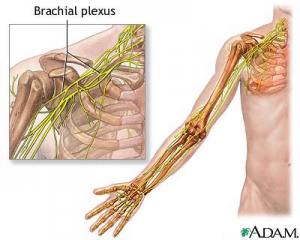 I get this question a lot, so I decided to write a little post to answer it. Let me first say that I am not a Doctor but I did stay at a Holiday Inn Express. This is a joke, if you haven't seen the commercial. My experience with pitching injuries are from my personal experiences with a few bone spurs in my elbow and a rotator cuff tear at 18 years old. I have spent countless hours in Doctor offices and with all types of physical therapists and trainers. I may not be a Doctor but I am a bit of an expert on pitching injures.
I get this question a lot, so I decided to write a little post to answer it. Let me first say that I am not a Doctor but I did stay at a Holiday Inn Express. This is a joke, if you haven't seen the commercial. My experience with pitching injuries are from my personal experiences with a few bone spurs in my elbow and a rotator cuff tear at 18 years old. I have spent countless hours in Doctor offices and with all types of physical therapists and trainers. I may not be a Doctor but I am a bit of an expert on pitching injures.
The progression of a pitching arm injury starts first with muscle pain. There are two types of muscle pain.
- Muscle Soreness
- Muscle Damage
Muscle soreness is when the pain is at an uncomfortable level but you still have your strength. When that feeling of discomfort grows more intense and evolves into muscle weakness, then this is a good sign of damage. Damage can mean a few things. Either you have a few small muscle tears or frays which is causing high amounts of inflammation, or you have a good size muscle tear. Whatever the damage, it is going to take some time to heal. Because this post is about the signs of damage, I will not go into how to heal a damaged arm in this post. I will list here some of the main side effect of muscle damage in the pitching arm.
Signs of Damage in the Pitching Arm
- Loss of Range of Motion - If you can NOT move your arm in all directions, like you could before, then this could be a sign of damage or future damage.
- Loss of Strength - If you can move your arm in all directions but you are very weak in some areas then this could be a sign of damage or future damage.
- Sharp Pain Only When Pitching - If you experience a sharp pain when your arm is abducted behind your head or fully externally rotated then this could be a sign of damage or future damage. This usually means you have an impingement which can cause serious damage to your rotator cuff.
- Big Drop in Velocity - If your velocity drops a good 10 mph then this could be a sign of damage or future damage.
If you or someone you know has experienced one of these signs then I recommend you see a Sports Medicine Doctor. Do not waste your time with a General Practitioner who has worked on very few baseball pitchers. Find someone who is experience in sports related injuries. This will save you a lot of time, money and maybe your career.




how long does it take to get back to perfect again , and did this happen to you before your rotator cuff injury occured?
It depends on the damage in your arm. My arm started breaking down way before the surgery. It gave me plenty of signs but due to my lack of education with sports injuries I continued to pitch through it. Jim Morris talks about this same issue in the interview here http://topvelocity.net/jim-the-rookie-morris-inte…
did it just happen on one pitch …..what did it feel like?
It happened in my first college appearance. I was the number two starter and it was in our second game my freshman year. I was in the fourth inning and all of a sudden I threw a pitch and my arm completely gave out. I was stupid at the time and was on massive amounts of anti-inflammatories along with ben gay and the pain was still bad. This is why when my arm gave out it wasn't excruciating. I literally couldn't move my arm again until I had surgery.
When I was pitching this summer I was being clocked at 83-86mph and I committed to a d1 school, Coppin state university. My first 4 weeks in college I have been lifting, running, doing plyos like crazy before baseball practices started. When they first started we have been throwing 40’s from flat ground, short toss, long tossing, and threw off a mound once before our inter squad scrimmages. my first intersquad I was clocked at 74-76 and to be honest I was pissed off, still am and I’m worried and wondering how the hell I lost that much velocity in 2-3 months. My teammates say it could be the fact the mound we pitch on is shit, it’s early in the season. I think it’s the fact that I lost flexibility, little to no mound time, Ive stiffened up from lifting, and maybe my mechanics fell apart a llittle bit, 40’s are messing me up, and pur coach makes us drun 3 miles every other day. Could u give me your thoughts as soon as possible cuz I’m starting to worry and have a goal of reaching 90 mph+ on the radar gun this season.
The weights are not causing the problem. The problem is the 3 mile run and you must be changing your mechanics. I would post a video on the forums for analysis.
I’m 14. I’ve been having a lot of pain in my inner elbow whenever I throw the ball. There is also pain when I fully extend my arm and bend it. Sometimes things like turning a doorknob can hurt. I haven’t lost little too any velocity, I still clock in at high 70’s to low 80’s. I also have an extremely high pain tolerance. This has been going on for about 1 1/2 months. Is this serious or just icing and rest will get rid of the pain?
I would recommend you go to a Sports Medicine Doctor if the pain persists.
I recently tore my cal and had surgery and had it fixed. It has been since November since I have thrown a baseball but I was finally cleared to start tossing and work my way back into pitching. The other day I was throwing with my dad I noticed shoulder pain and stopped throwing. It is a pain that I can throw through but I want to get rid of the pain. I was trying to figure out where this pain came from and what to do to fix it. Is it from me not tossing since November or is it something else. What should I do ?